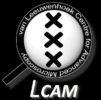FEBS Advanced course “Functional imaging of cellular dynamics”, June 2024
Title: LCAM-FEBS Advanced course “Functional imaging”Date: 9-15 June 2024Location: LCAM-FNWI, -NKI & -AMCContact: Mark HinkPrevious editions: 2015, 2017, 2019, 2022 & In the Footsteps of van Leeuwenhoek (bi-annual)Sponsor: Federation of European Biochemical Societies (FEBS) Introduction: The ability of cells to …
FEBS Advanced course “Functional imaging of cellular dynamics”, June 2024 Read more »
